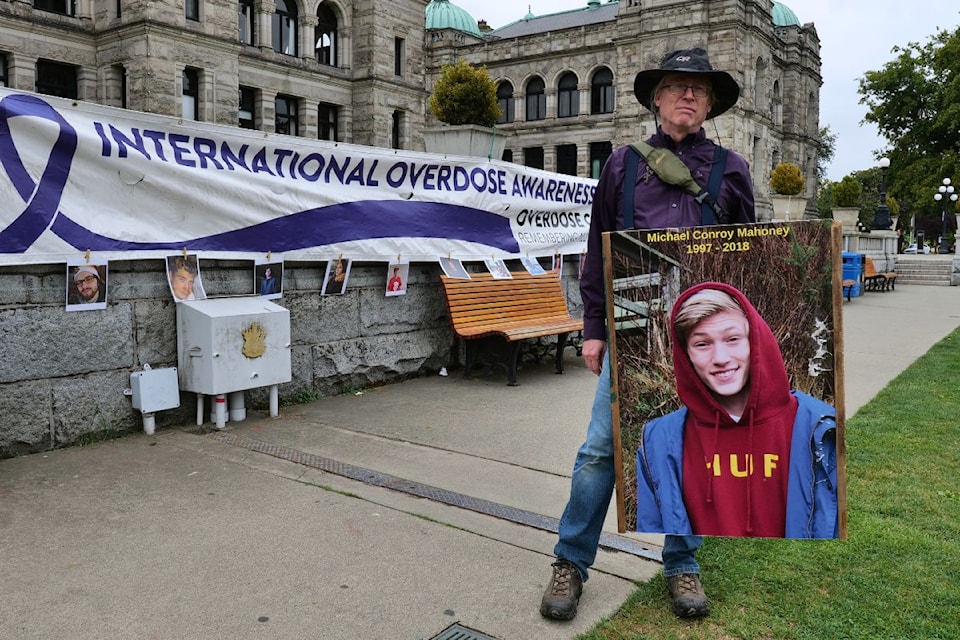Health
British Columbia Families Demand Action on Drug Crisis Amid Rising Deaths

Families in British Columbia gathered at the legislature on Overdose Prevention Day to honor loved ones lost to the ongoing drug crisis, which has claimed over 17,000 lives since the public health emergency was declared in April 2016. Among the attendees was Glenn Mahoney, who shared his heart-wrenching story of his son, Michael Mahoney, who developed a substance use disorder at age 13 after being prescribed oxycodone. Michael’s life ended tragically at the age of 21 when he died alone in his car, a fate that has befallen many in the province.
The gathering highlighted the alarming fact that an additional 2,000 people have died from toxic drug use in the last year alone. Mahoney expressed his frustration, stating, “I always find it shocking that people aren’t outraged at this level of death.” The event featured poignant displays, including participants lying on the steps of the legislature, covered with signs that read, “They were so loved,” and photos of the deceased strung along a fence.
In her speech, former B.C. chief coroner Lisa Lapointe emphasized that drug toxicity remains the leading cause of death for individuals aged 19 to 59 in the province. She questioned the lack of governmental response, stating, “What could be more important?” and called for standardized, evidence-based, free treatment options.
Despite their educational backgrounds, Glenn and his wife, Jan, struggled to navigate the healthcare system to find help for Michael. They resorted to expensive private treatment programs, which they felt stigmatized those who required prescribed psychiatric medications. “In every step, you’re punished and stigmatized,” Glenn lamented.
Michael’s case was notably referenced by the coroners’ death review panel in 2020, highlighting the family’s numerous interactions with the healthcare system, including denied applications by Island Health and rejection from community psychiatrists. “At every point and every encounter, the system made his condition worse,” Glenn stated, calling it a failure of public policy.
Both Lapointe and Kelsey Roden, a physician and co-founder of Doctors for Safer Drug Policy, stressed that while there has been progress with overdose prevention sites and safe supply initiatives, the ongoing stigma and prohibition surrounding drug use continue to contribute to rising death rates.
Lapointe pointed to actionable steps that could significantly reduce fatalities, stressing the need to recognize the crisis as a health issue. She criticized the allowance of private residential treatment centers to charge tens of thousands of dollars for unregulated services and advocated for pharmaceutical alternatives as a critical component in stabilizing individuals and moving them away from the chaotic drug trade.
For the Mahoney family, the fight is far from over. They remain committed to advocating for systemic change to prevent other families from enduring similar losses. Jan Mahoney reflected on her son’s vibrant life, describing him as a “creative, artistic, funny, caring and polite” young man who once sang with the Victoria Opera.
“If I have to be here every year until I’m 100 … I’m gonna be here to tell the government that this is not good enough. These lives matter,” she declared, underscoring the deep emotional impact of the ongoing crisis and the urgent need for effective policy changes.
-

 Education2 months ago
Education2 months agoBrandon University’s Failed $5 Million Project Sparks Oversight Review
-

 Lifestyle3 months ago
Lifestyle3 months agoWinnipeg Celebrates Culinary Creativity During Le Burger Week 2025
-

 Science3 months ago
Science3 months agoMicrosoft Confirms U.S. Law Overrules Canadian Data Sovereignty
-

 Health3 months ago
Health3 months agoMontreal’s Groupe Marcelle Leads Canadian Cosmetic Industry Growth
-

 Science3 months ago
Science3 months agoTech Innovator Amandipp Singh Transforms Hiring for Disabled
-

 Technology3 months ago
Technology3 months agoDragon Ball: Sparking! Zero Launching on Switch and Switch 2 This November
-

 Education3 months ago
Education3 months agoRed River College Launches New Programs to Address Industry Needs
-

 Technology3 months ago
Technology3 months agoGoogle Pixel 10 Pro Fold Specs Unveiled Ahead of Launch
-

 Technology1 month ago
Technology1 month agoDiscord Faces Serious Security Breach Affecting Millions
-

 Business2 months ago
Business2 months agoRocket Lab Reports Strong Q2 2025 Revenue Growth and Future Plans
-

 Science3 months ago
Science3 months agoChina’s Wukong Spacesuit Sets New Standard for AI in Space
-

 Education3 months ago
Education3 months agoAlberta Teachers’ Strike: Potential Impacts on Students and Families
-

 Technology3 months ago
Technology3 months agoWorld of Warcraft Players Buzz Over 19-Quest Bee Challenge
-

 Business3 months ago
Business3 months agoNew Estimates Reveal ChatGPT-5 Energy Use Could Soar
-

 Business3 months ago
Business3 months agoDawson City Residents Rally Around Buy Canadian Movement
-

 Education3 months ago
Education3 months agoNew SĆIȺNEW̱ SṮEȽIṮḴEȽ Elementary Opens in Langford for 2025/2026 Year
-

 Technology1 month ago
Technology1 month agoHuawei MatePad 12X Redefines Tablet Experience for Professionals
-

 Technology3 months ago
Technology3 months agoFuture Entertainment Launches DDoD with Gameplay Trailer Showcase
-

 Business3 months ago
Business3 months agoBNA Brewing to Open New Bowling Alley in Downtown Penticton
-

 Technology3 months ago
Technology3 months agoGlobal Launch of Ragnarok M: Classic Set for September 3, 2025
-

 Technology3 months ago
Technology3 months agoInnovative 140W GaN Travel Adapter Combines Power and Convenience
-

 Science3 months ago
Science3 months agoXi Labs Innovates with New AI Operating System Set for 2025 Launch
-

 Technology3 months ago
Technology3 months agoNew IDR01 Smart Ring Offers Advanced Sports Tracking for $169
-

 Technology3 months ago
Technology3 months agoDiscover the Relaxing Charm of Tiny Bookshop: A Cozy Gaming Escape










